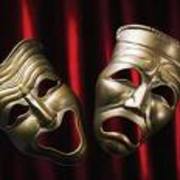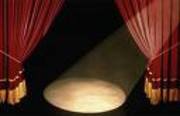Drama
Scene 1...Take 1!
"The World is your Stage, Your Enviornment is the Setting, Life is the Plot and You are the Main Character...Now Write Your Script!" Denise Dukes
333
Drama comes from Greek words meaning "to do" or "to act." A play is a story acted out. It shows people going through some eventful period in their lives, seriously or humorously. The speech and action of a play recreate the flow of human life.
A play comes fully to life only on the stage. On the stage it combines many arts those of the author, director, actor, designer, and others. Dramatic performance involves an intricate process of rehearsal based upon imagery inherent in the dramatic text.
A playwright first invents a drama out of mental imagery. The dramatic text presents the drama as a range of verbal imagery. The language of drama can range between great extremes: on the one hand, an intensely theatrical and ritualistic manner; and on the other, an almost exact reproduction of real life.
A dramatic monologue is a type of lyrical poem or narrative piece that has a person speaking to a select listener and revealing his character in a dramatic situation.
Types of Drama:
1. Tragedy -- In general, tragedy involves the ruin of the leading characters. To the Greeks, it meant the destruction of some noble person through fate, To the Elizabethans, it meant in the first place death and in the second place the destruction of some noble person through a flaw in his character. Today it may not involve death so much as a dismal life, Modern tragedy often shows the tragedy not of the strong and noble but of the weak and mean.
2. Comedy -- is lighter drama in which the leading characters overcome the difficulties which temporarily beset them
3. Problem Play -- Drama of social criticism discusses social, economic, or political problems by means of a play.
4. Farce -- When comedy involves ridiculous or hilarious complications without regard for human values, it becomes farce.
5. Comedy of Manners -- Comedy which wittily portrays fashionable life.
6. Fantasy -- A play sometimes, but not always, in comic spirit in which the author gives free reign to his fantasy, allowing things to happen without regard to reality.
7. Melodrama -- Like farce, melodrama pays almost no attention to human values, but its object is to give a thrill instead of a laugh. Often good entertainment, never any literary value.
333
What We Do:
Provide educational classes in Dramatic Acting.
• Maintain age appropriate classes for students in grades K-12.
• Create a fun social environment where students feel free to express themselves
• Provide the foundation of basic skills to pursue a professional career in drama, if desired
• Provide teachers who are professionally trained and are sensitive to the unique needs of each individual student.
• Provide structured lessons with plenty of review to help the students retain what they have learned.
333
THE FOUR LEARNING LEVELS
The following levels are the heart of the Erickson Drama/Learning Program, which has been adopted by the International School of Performing Arts Drama Instruction Program.
LEVEL I: Foundation for Drama
Participants focus on DEVELOPING skills needed to participate in drama. The instructor builds a base and a place where drama can happen SAFELY for all participants at the individual development level of each group. SAFETY is of the utmost importance: intellectual, Emotional, and Physical safety.
LEVEL II: Drama as Art
Students create Dramatic art works: pieces having a beginning, middle, and end; revolving around a conflict; showing characters in action; and culminating in a resolution.
LEVEL III: Life Drama
This level uses everything the students have learned in Level I and II above. Students create their own Dramas based on a particular theme, culture, or unit they have developed. Level III Dramas are not characterized by planning and practicing. They happen improvisationally with the instructor playing “in role” and leading them from moment to moment. Students experience life-like events as they unfold in the classroom through the dramatic process.
LEVEL IV: Point of View Drama
This level combines the first three levels into fast paced instructor and student directed activities. This level uses Level I Foundation activities, Level II Drama as Art, and Level III Life Drama approaches all within a single session. Students explore a concept or idea from different Points of View, switching roles and vantage points often throughout the work.

